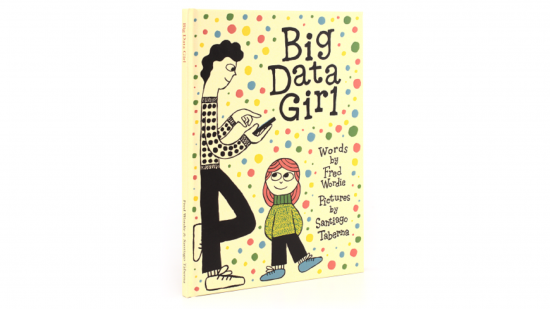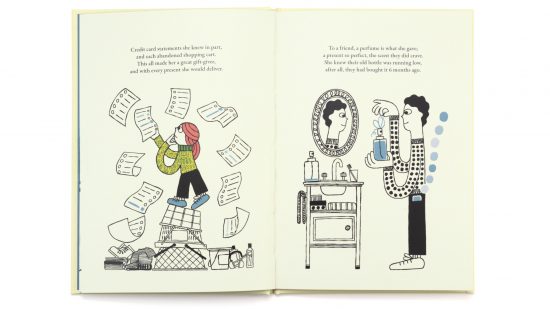Fred Wordie’s Big Data Girl, illustrated by Santiago Taberna in an eye-catching limited-colour format, is either a very important book or a missed opportunity – and it’s difficult to decide without trying it with your own children.
Funded via Kickstarter late last year, Big Data Girl positioned itself as highlighting the impact of ‘big data’ – data gathered, held, analysed and traded by big corporations for purposes from targeted advertising to healthcare provision – to both kids and adults in the form of a picture book.
In this book, Big Data is – as the title suggests – a girl. A child, specifically, but one who seems to have an odd amount of freedom, and uses that freedom to befriend as many people as possible. ‘She knew everything, about everyone – from where they’d shopped to how they had fun,’ the book opens. ‘[She] was so helpful,’ Wordie continues, ‘you just couldn’t hate her.’
Should you hate Big Data? The question is never raised in quite such bold terms but it’s clear Wordie and Taberna are aiming to foster discussion, at least. To do this, the book leans on real-world examples of the use and abuse of (no capitals) big data. On the positive side of the ledger, Big Data uses information gathered from a reader’s Kindle to recommend a new book, pores over credit card statements to recommend presents, and even offers medical advice to a friend with the sniffles.
Less positively, Big Data puts her foot in it with the gift of a crib to a family who had no idea their teenage daughter was pregnant – a tale based on a real-world case from 2012 when retail giant Target used a pregnancy-prediction algorithm written by statistician Andrew Pole to send a family coupons on baby products, including a crib, long before the family’s teenage daughter had been ready to tell her parents she was pregnant.
After that, people treat Big Data with more suspicion – but the child tells them they simply have to trust her discretion, then starts making deliberate mistakes to suggest her knowledge isn’t all-encompassing after all. ‘She was the girl that we called “Big Data”,’ the book concludes, ‘and could persuade anyone not to hate her.’
With no footnotes or references to follow in order to find the real-world cases on which the book is based, there’s not too much in this book that’s really useful for adults.
For children, it’s potentially of more value – but tested on a nine-year-old just ahead of Internet Safety Week, the message proved muddled with the allegorical representation of big data as a girl being lost. ‘It’s about knowing how to keep your friends’ secrets,’ the nine-year-old reader concluded – a fair guess, but far from Wordie and Taberna’s intended interpretation.
The book also suffers from clunky writing at times, typically in service of the rhyming couplet format. Several lines fail to scan, while others sacrifice the passage’s meaning on the altar of rhyme: ‘her grasp of their lives did greatly define’ works for no definition of ‘define’, with the word having been clearly chosen purely for its ability to rhyme with ‘online’ from the line above.
As a tool to introduce the concepts of big data and digital privacy to older children, though, there’s definite merit – as long as you accept Big Data Girl as a starting point for discussion rather than a standalone explainer. Big Data Girl is available now exclusively from bigdatagirl.com for £18 in hardback (VAT exempt) or pay-what-you-want as a DRM-free PDF.
Price
£18

